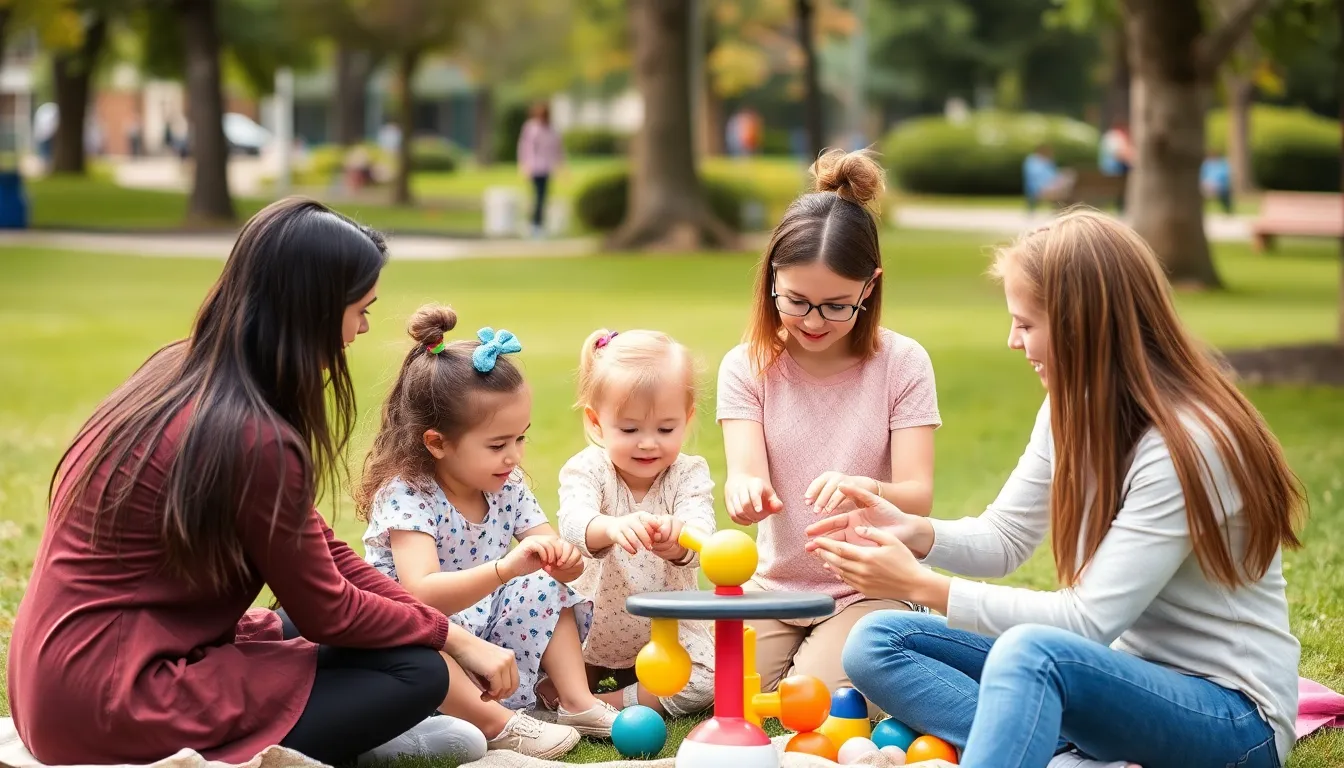Parenting isn’t what it used to be, and thank goodness for that! Gone are the days of strict rules and rigid routines. Today, parents juggle everything from screen time limits to organic kale snacks, all while trying to maintain their sanity. With the rise of social media and endless parenting blogs, the evolution of parenting has transformed into a wild rollercoaster ride—one that’s both thrilling and terrifying.
As parents navigate this ever-changing landscape, they find themselves in a constant battle between tradition and innovation. The modern parent embraces flexibility, humor, and a hefty dose of caffeine to tackle the challenges of raising kids in a world that seems to change faster than a toddler can throw a tantrum. Join the journey through the quirky, chaotic, and enlightening evolution of parenting, where every day is a new adventure filled with laughter and lessons.
Table of Contents
ToggleOverview of Parenting Evolution
Parenting has transformed significantly over the decades. Early practices focused on strict rules and a disciplinary approach. Today’s parents often adopt flexible methods that encourage open communication and humor. A shift towards nurturing emotional intelligence and empathy became essential as research on child development evolved.
Modern challenges include managing screen time and fostering healthy eating habits. Parents face increased pressure from social media, which often portrays idealized versions of parenting. It influences expectations and can lead to feelings of inadequacy.
New frameworks, like positive parenting, emphasize supportive environments rather than just obedience. Many parents now prioritize attachment styles and emphasize building strong emotional connections. Techniques such as mindful parenting encourage awareness of both children’s and parents’ emotions.
Trends show that balancing tradition with innovation is crucial. Techniques from past generations mix with contemporary ideas, creating a unique parenting style tailored for each family. Resources like parenting blogs and forums provide community support, connecting parents with shared experiences.
Today’s parenting landscape is dynamic, filled with diverse approaches. Embracing the chaotic nature of parenting can lead to enriching experiences. Each day presents opportunities for learning and growth, often in unexpected ways.
Historical Milestones in Parenting

Parenting has transformed through various historical milestones, reflecting changes in societal values and understanding of child development.
Early Parenting Practices
In early societies, parenting focused on survival and basic needs. Methods included communal care where families raised children collectively. Consideration for emotional bonds started to emerge, especially within close-knit communities. Caregivers nurtured infants through attachment, fostering early relationships. Support systems existed through extended family networks, with shared responsibilities. Techniques like co-sleeping and breastfeeding became standard, emphasizing the importance of physical closeness.
Parenting in Ancient Civilizations
Ancient civilizations influenced the evolution of parenting significantly. In Egypt, parents placed importance on education and childhood rights. The Greek philosophers, like Plato, emphasized reason and moral development. Meanwhile, the Romans promoted discipline but also recognized the need for affection in upbringing. Children were seen as future contributors to society, leading to structured educational systems. Practices varied widely across cultures, reflecting local beliefs and customs. Social status impacted parenting styles, with wealthier families often opting for more formal education.
Modern Parenting Trends
Modern parenting embraces innovation while prioritizing emotional connections. Each day uncovers new challenges brought by evolving societal norms and technological advancements.
The Impact of Technology
Technology shapes parenting in profound ways. Parents use apps and devices to monitor screen time and promote educational content. Online resources also offer valuable parenting tips and community support, although social media can lead to unrealistic expectations. Balancing tech use requires vigilance to safeguard children’s mental health. Parents often curate online experiences, leaning toward educational tools rather than passive consumption. Social interactions are also shifting, with virtual connections becoming common among children. Technology can both enhance learning and create distractions, making conscious usage essential for healthy development.
Changes in Parental Roles
Parental roles continue to evolve significantly. More fathers are taking active involvement in caregiving and household responsibilities. Shifting workplace dynamics also enable flexible work arrangements, allowing parents to balance career and family life. Both parents now often share decision-making responsibilities, fostering collaboration in child-rearing practices. This partnership encourages diverse input in shaping children’s values. Parents also increasingly value emotional intelligence, urging open communication and empathetic connections. As gender roles blur, modern parenting reflects a more inclusive approach that benefits families as a whole.
Cultural Influences on Parenting Evolution
Cultural factors play a critical role in shaping parenting practices. Parenting across different cultures showcases unique approaches based on historical, societal, and familial contexts.
Parenting Across Different Cultures
Cultural norms dictate child-rearing methods. For instance, collectivist societies emphasize communal upbringing, where extended families participate in childcare. In contrast, individualistic cultures prioritize independence, encouraging children to develop self-sufficiency. Rituals and customs related to parenting differ significantly. In some cultures, rites of passage signal developmental milestones, while others focus on formal education and academic success from an early age. These diverse practices reflect varying values, influencing how parents nurture their children and instill moral values.
The Role of Socioeconomic Factors
Socioeconomic status greatly impacts parenting styles. Families with higher income often afford educational resources and extracurricular activities, emphasizing development. Alternatively, lower-income families may focus on basic needs, which can limit access to enrichment experiences. Parenting practices also adapt based on economic pressures. Parents in lower socioeconomic brackets might emphasize survival skills over emotional support, whereas those with financial stability can prioritize nurturing emotional intelligence. This disparity affects children’s overall development, influencing their academic achievement and social interactions.
Future Trends in Parenting
Emerging trends indicate a shift toward technology integration in parenting. Artificial intelligence tools are becoming central in daily routines. Parents increasingly use apps for tracking developmental milestones and scheduling activities. Increased reliance on telehealth services offers support for mental health, providing families with accessible resources.
Flexibility in work arrangements supports parents balancing their careers and home life. As more fathers engage in caregiving, they contribute significantly to child-rearing dynamics. Greater involvement leads to stronger emotional connections within families.
Social media also plays a critical role in shaping parenting practices. Parents turn to online communities for advice, sharing experiences and strategies. Enhanced emphasis on authenticity encourages open discussions about the struggles of parenthood. These dialogues facilitate a more fulfilling parenting experience as families learn from one another.
Inclusivity emerges as a focal point in future parenting approaches. Parent-led initiatives promote diverse family structures, emphasizing acceptance and understanding. Organizations are increasingly advocating for equitable resources, aiming to reduce disparities among socioeconomic groups.
Mindfulness and well-being gain prominence in parenting philosophies. Practices such as meditation and yoga are becoming commonplace for both parents and children. Emphasizing emotional intelligence fosters resilience and adaptability within children, preparing them for future challenges.
Educational interventions continue to evolve, incorporating innovative teaching methods. Hands-on learning is prioritized over traditional approaches, catering to children’s varied learning styles. Moreover, a shift toward experiential learning supports creativity and critical thinking.
These trends highlight the ongoing evolution of parenting, reflecting changing societal values and technological advancements. Families are navigating this complex landscape by embracing new methods and prioritizing well-being, collaboration, and inclusivity.
The evolution of parenting showcases a remarkable journey shaped by societal changes and cultural influences. Today’s parents blend traditional values with contemporary practices to create nurturing environments that prioritize emotional intelligence and empathy. As they navigate the complexities of modern life, they embrace technology and innovative approaches while fostering open communication within families.
This ongoing transformation reflects a commitment to inclusivity and well-being, allowing families to adapt and thrive in an ever-changing landscape. With each new challenge, parents continue to learn and grow, ensuring that the essence of parenting remains rooted in love and connection.





